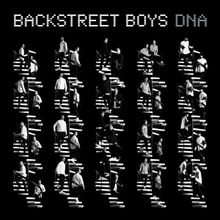The legendary Backstreet Boys are back at it with a new album, titled DNA. While its name may suggest a foray into each member’s individuality and influences, the only thing to be found on this album is a heartless attempt of a once chart-topping band struggling to claw its way back to pop relevancy.
The boy band comprised of members AJ McLean, Howie Dorough, Nick Carter, Kevin Richardson and Brian Littrell reached meteoric super-stardom in the late 1990’s. They had the best selling album in the United States in 1999, titled Millenium, which featured chart smashing classics like “I Want It That Way.” On top of that, they reached heights of popularity never seen by some equally successful bands: they received keys to the city of Orlando in 1998, and city declared October 7th as “Backstreet Boys Day.”
It’s clear that the Backstreet Boys were at the pinnacle of the American cultural zeitgeist in the 1990’s. Despite their success, though, they were destined to face the inevitable fate intrinsic to all boy bands: growing old.
However, there’s no shortage of examples of boy bands that aged gracefully. The Beach Boys released one of their most forward thinking, mature works later in their career with their seminal 1966 album Pet Sounds. Michael Jackson revolutionized pop music in his solo career after parting from the Jackson 5. Even the Beatles were considered a boy band in their early days, and their relevance in pop and rock music continued late into their careers.
It’s equally important to recognize as well the unfounded stigma against boy bands’ music- the notion that it’s mindless pop music for women too dumb to understand “real” music. It’s a tired sentiment, and one totally unsupported by the legacy of boy bands such as the Backstreet Boys. Boy bands helped define the pop landscape of the 1990s, and some of today’s most compelling and forward thinking artists acknowledge their influence, such as experimental hip-hop artist JPEGMAFIA.

All of this is to say that the Backstreet Boys’ history supports the possibility that they could mature gracefully and create great music in 2019. On DNA, however, the Backstreet Boys have failed to evolve as artists and have instead opted to staple their harmonized voices onto an assortment of instrumentals torn straight out of the contemporary pop playbook.
The album’s opener, “Don’t Go Breaking My Heart,” is an over-polished, soulless approximation of modern R&B a la The Weekend. “Breathe” forgoes any facade of originality as it copies the a Capella styling of Pentatonix. “The Way It Was” takes the retro-soul styling of Sharon Jones and Charles Bradley, bleaches it and power-washes it for good measure, and pastes the Boys’ clean, harmonized vocals on top.
For the most part, the lyrics on DNA run the gamut of vague romantic musings. There are only a few moments where the lyrics stick out, and when they do, it’s not a pretty affair. On the fuzzy, rock-fueled “New Love,” Carter sings, “Who are you the sex police?/My sex ain’t got no rules.” It’s already disconcerting to hear a nearly 40 year old man sing this, but even more so when one takes into account the rape allegations raised against Carter last year. There’s also painful irony to be found in the possessive lyrics of “No One Else,” in which the Boys sing about wanting to stop time. In a way, subconsciously or otherwise, even they themselves wish they were their 1999 selves again.
Overall, the bulk of the music on DNA isn’t poorly written or performed. The main issue plaguing this new release is that it’s as tastelessly inoffensive as a Target commercial and devoid of the energy that made the Backstreet Boy’s chart topping music so catchy. Fans of the Backstreet Boys should stick with their older albums, and anyone looking for quality modern pop music is better off looking almost anywhere else.
1.5 out of 5 stars.



